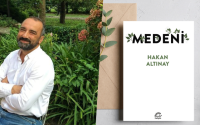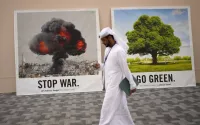On the streets of Iraq, they won't believe Uday and Qusay are dead until they see the bodies
24 July 2003The Independent
In the streets of Baghdad, they were asking for proof that Uday and Qusay Hussein had been killed. How about some pictures of the dead brothers? In the cavernous interior of the city's convention centre, we were asking the American commander in Iraq why he didn't capture Saddam Hussein's two sons. Didn't the two know all about those infamous weapons of mass destruction? Didn't President George Bush once tell us that they should be put on trial for war crimes?
Iraqis have no interest in the bragging of Tony Blair, and his claims that the world is a more secure place because Uday and Qusay are dead. They want proof from the Americans that it's true. Now. And what did Lieutenant-General Ricardo Sanchez say? "The Department of Defence has got that under discussion at this point of time - no policy decision has been made at this point."
So what about the little matter of blasting their way into Uday's and Qusay's Mosul hiding place with helicopter rockets and 10 anti-armour TOW missiles rather than collaring the evil brothers and putting them on trial, to emphasise - over months - the wickedness of Saddam's rule. It turned out - this is according to Lt-Gen Sanchez - that the "commander on the ground" in Mosul decided to storm the building; it was an "operational decision". This was breathtaking.
An officer in the 101st Airborne Division, with hours to plan a siege, gave the order to his 200 soldiers to blast their way into the house at 11.55am on Tuesday. Just like that. Wasn't Lt-Gen Sanchez consulted? Wasn't President Bush? Or had the decision already been taken to kill them?
Now Lt-Gen Sanchez is obviously a smart guy, and he told us that his soldiers had initially adopted the "cordon and knock" procedure. This appeared to be a military version of the old "Avon calling" technique in which a soldier with a bullhorn ordered the brothers to give themselves up before military action began. Twice the Americans attempted to storm the fortified upper floor of the villa, receiving four wounded - three on the stairs and one outside at the first attempt - when the four occupants of the house fired Kalashnikov rifles at them.
But now came the point. The Americans are experts in siege techniques (viz General Manuel Noriega). So why not put a cordon round the villa, clear local civilians, point lights at the building, blast it with loud music (the Noriega technique) and starve them out. No Iraqi would doubt the truth if they eventually saw Uday and Qusayemerging with their hands up.
But no. In went the rockets from the Kiowa CH-58 helicopters, in went the 10 TOWs, in went the 50-calibre machine- gun bullets - there were also Apache gunships and A-10 anti-tank aircraft in readiness, for heaven's sake - and on the third attempt to enter, "there was no fire as we moved up the stairs". Surprise, surprise. But then again, had not Lt-Gen Sanchez admitted that preparations had been made to "neutralise the target"?
Now there are Iraqis aplenty who would like Uday and Qusay dead, especially Uday. But promising that "senior former regime members" had identified the corpses and that the dental records matched and declaring that "we are certain that we have Qusay and Uday" doesn't amount to a hill of beans in Saadun Street.
Lt-Gen Sanchez's rhetoric was a little troubling, partly because a Saddam tape surfaced yesterday with exhortations of almost equal exaggeration. Saddam's peroration to Iraqis came in his usual scratchy voice, courtesy of al-Arabiya television station. Since he made it five days ago, it was a little out of tune with reality. His sons, faintly alluded to in the text, were then still alive.
But it was the authentic Saddam, even referring to a previous Sanchez address to the nation. "When the enemy declares that the war has not ended in Iraq, he is quite right because it has not finished at any level ... the enemy won the fight but he failed to achieve other things ... I call upon you to start rejoining the mujahedin ... and to make contact with others to do the same ... everyone is now a commander."
So thought, no doubt, the armed men - heads cloaked in keffiyeh scarves and holding Kalashnikovs - who appeared on the streets of the desperately violent and anti-American city of Ramadi yesterday with their portraits of Saddam, Uday and Qusay. So perhaps thought the demonstrators who protested in Mosul yesterday, just as a sergeant in the 101st Airborne, discovering that he'd helped to kill the brothers, described how he and his comrades felt "high vibes ... it was a good gig". And so perhaps did the killers of two American soldiers yesterday.
But troubling questions remained. Did the Americans not realise that without those vital photographs of the dead, all their sound and fury and boasting would count for nothing? There was talk among the occupation authorities in Baghdad yesterday about the need to abide by the Geneva Conventions, an intriguing concern when quite a few Conventions went by the board in the recent war. Even if the pictures are delayed for 24 hours, they will lose 50 per cent of their credibility. Digitalised, Iraqis will claim. A clever photomontage.
And there was also that lingering suspicion that killing Uday and Qusay was more important than capturing them. There was also more than a little curiosity about the persistent report that one of the four dead was 14 - perhaps Saddam's grandson - whom Lt-Gen Sanchez referred to oddly not as a man but as an "individual". He suggested that the "youngest" of the people in the house was the last to die. Is that true? Was he 14? Was he shooting at the Americans?
Yes, Mr Blair informed us that it was "a great day for the new Iraq" but you wouldn't have known that in Iraq yesterday. The best newspaper in town didn't even make the deaths its headline - the lead was the failure of the new Iraqi "interim" government to choose a leader for the second day running. But then again, a few weeks ago the death of an American soldier in Iraq would have been in the first paragraph of this dispatch rather than the ninth. And that, in a sense, tells you the whole story.






